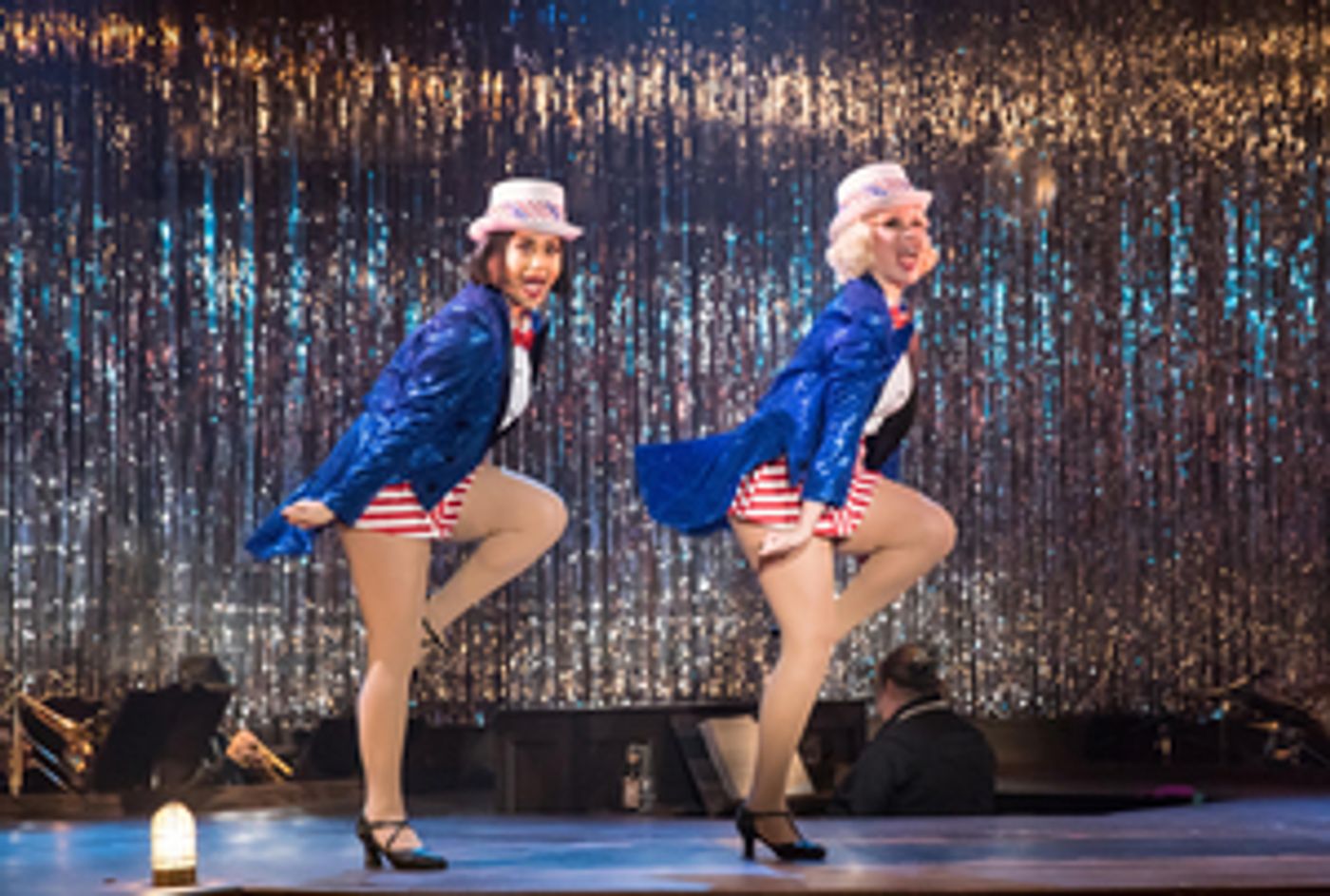Interview: Britta Ollmann and Michelle de Joya of CHICAGO at Theater Latte Da

Theater Latte Da is razzle dazzling audiences at the Ritz Theater in Minneapolis in their 22nd season with a "re-imagined" production of CHICAGO. The musical, which has been running on Broadway since 1996, is the second longest running American musical on Broadway, ever. With the current events of the day including topics of celebrity, breaking the law, "fake news," and more, you'd think this show was written recently. As always, the more things change, the more they stay the same. That's probably got a lot to do with the show's longevity, too.
It's a treat to see a new local production, and in director Peter Rothstein's take, the audience sits on stage and in close quarters with the ensemble cast. The Ritz is already an intimate setting, but here the audience is welcomed into their world as part of the audience of a club with a Vaudeville show. Sitting that close to the action, one could start to feel like they know a person. So when I got a chance to talk to both the two leading ladies, Britta Ollmann (Roxie Hart) and Michelle de Joya (Velma Kelly), I felt compelled, as a member of the press, of course, to start with a probing, bonus question. From then on, you are getting a double-dose of 6 Questions & a Plug.
But, did you do it?!
Britta: "I killed him, yes. But I am not a criminal."
Michelle: "[...] I'm sure I didn't do it. I've the tenderest heart in the world." as Miss Velma Kelly says. When I first read the script, I realized that Velma never actually states that she killed her husband, Charlie, and her sister, Veronica, so I've always found that even though this double homicide is what skyrocketed her fame, she must have had a little bit of guilt deep down, and that's what caused her to be so blunt, closed-off, desperate, and aggressive throughout the story.

.jpg?format=auto&width=1400)
Rothstein was quoted as saying this is a brilliant musical satire about the American justice system, media circuses and a celebrity-driven society. How much did what is happening in the current world affect your performance? Did you discuss this aspect while developing the characters? It does seem like this musical is almost more relevant now than ever before.
Britta: In every rehearsal process with Latte Da, there are a couple days spent in conversation with the script, the full cast, and the creative team. It's our opportunity to understand the story as it's revealed to the audience and to voice connections to both history and present day experience. We get on our feet in those first days of rehearsal having had those conversations as an ensemble, and those connections certainly ring in my ears throughout the process.
Michelle: We spent a long time talking about the intent of the "Six Merry Murderesses". And I think their title encapsulates them perfectly. They often are viewed by audiences as victims of abuse. But, the terrible truth is that the people they murdered were not deserving of losing their lives -- I mean, Bernie died for chewing gum? Really? It just goes to show you how we as a country make excuses for the murderers and always focus on their story as troubled victims, but rarely take the time to really look into the lives that were lost in the crossfire. By calling them "Merry Murderesses" we really call attention to the fact that these people are happily benefiting off their terrible crimes.
During the post-show discussion, an audience member brought up how the foreign-born murderess was hung while the two of your characters got off through a combination of "how you present" and what you have. Did the current affairs at the U.S. border come up in the rehearsal process and how the hanging scene was executed?
Michelle: I think most people who are monolingual have experienced a time when someone was short tempered with another person who didn't speak their own language. This is evident with the character of Hunyak. Even Mama Morton (who learns to speak Hungarian) still isolates Hunyak by referring to her as "The Hungarian". We talked about how differently that would feel today if someone were to call a person as simply, "The Mexican" for example -- how hurtful and inappropriate that would be. That lack of patience and lack of care for someone who is "different" is exactly why Hunyak is the first woman to be hung rather than the charming press-pandering women like Velma and Roxie who con and buy their way to innocence.
Britta: Who is seen and heard, and how and why, is definitely a point of exploration in the show. At one point, Peter identified Hunyak as the Sad Clown of our vaudevillian world: the one taking the fall while others find fame and freedom, the one who holds the spotlight only when they're suffering, the one we can look at and think "Man, I'm sure glad that's not happening to me." I do think this is reflected in the staging of Hunyak's final scene, and I don't think it's any mistake that the Sad Clown of "Chicago" is the person we see primarily as the "other."
This production has a very intimate feel with Ritz's close spaces and seating and stage spaces intertwined. How does this proximity to the audience affect the show for you as actors? Britta -- the performance I attended had a specific moment when your scene got an on-stage audience member giggling, and you held on brilliantly without breaking character. Do you have a lot of moments like this?
Britta: I've been getting a kick out of sharing the stage with audience members! The show lends itself so well to that direct interaction, so it's been a smooth and ultimately very useful transition into performing with an audience. I love that we are literally never left without a scene partner, and the personality of each audience is an exciting variable to play around with. There have been brilliant moments, along with some clunkers, and that's the beauty of being alive in the room together for the evening.
Michelle: I feel that the goal of the piece is to allow the audience to not only feel immersed, but to feel completely involved and almost responsible for what's happening on stage -- and thus feel responsible for what's happening in the world outside the theater. It can be jarring to sit that close to the gun shots and violence, but we want audiences to question their participation on the action. Because of this, we get mixed responses from audience members, some get swept into the merriment of the spectacle we're creating on stage, and some audience members turn their gaze when we attempt eye contact. It's an interesting response from both sides and while some artists could find these reactions distracting, they usually fuel me more to continue telling this challenging story.
What is your favorite number or scene, and why?
Michelle: Selfishly I LOVE to perform "When Velma Takes The Stand". It's such a high energy number, and contrary to "I Can't Do It Alone" which is driven by desperation, "WVTTS" is driven by confidence. Not a lot of people are familiar with the number since it's not in the movie, so it gives me the opportunity to really show the audience something new. Plus: a melodramatic faint, some spinning high kicks, and two sexy cop costumes, what more could you want?
Britta: Right now, my favorite moment is the end of Act One, when Roxie hatches a plan that I think finally reveals the full scope of her awareness and intelligence, which has been seriously in question up to that point. She learns the system and rules of the game fairly quickly, and she's willing to play hard. I love that about her, and I love the reveal of those qualities.
The costumes in this show involve a lot of lingerie--for both men and women--how much working out do you all have to do? I also was thinking about all the stairs in heels. Is that a challenge, too?
Britta: This cast is full of talented and disciplined dancers, actors, and singers who are always in the process of learning about, caring for, and working with their bodies. The physical, vocal, and energetic demands of the show are honestly motivation enough!
Michelle: While many of us do workout on our own time to stay in shape for the two hours' cardio of the show -- we don't approach the costume design as a pressure to appear as a certain body type. Just like the saying, "a bikini body is any body in a bikini" we try to live through example that while we performers are exceptional athletes, our builds are not that of a cookie cutter appearance. The heels and stairs on the other hand are a new challenge for most! I gave Dylan Rugh (one of our amazing ensemble men) a brief lesson for walking in heels: "It's like there's a bug a couple feet ahead of you and you just keep reaching your toe out to step on it! Hope that helps!"
Ha -- that's a good way of teaching it! Michelle, this was your debut at Latte Da, and Britta, this was one of many shows you've been a part of there. Can you each talk about your experience working at this company in this show? What did you discover and what's been your favorite part of CHICAGO?
Michelle: The best part of this process has been the overwhelming support, not only from my other actors but from entire team behind the table - especially Peter, Denise, and Kelli. I graduated a few years ago from the classical actor training program at the University of Minnesota/Guthrie Theater. So I thought my trajectory would be in the realm of Shakespeare. Luckily the over-the-top satirical elements transfer well to Musical Theater and especially our production of CHICAGO. It's been quite a challenge to figure out this vaudevillian whirlwind but I've loved getting to learn from and work alongside veteran actors like Britta, Robert, Reed, and Regina.
Britta: This is my first time back at work and back onstage since becoming a mommy this past June, and I couldn't have asked for a more supportive or understanding team of people to help me dive right back into the deep end. I was playing Petra in Latte Da's "A Little Night Music" until I was about 24 weeks pregnant, and that was the last show I did before taking time off, so returning to the theater on the other side of that life changing experience has felt really...right. My favorite part of this process so far, cheesy as it is, was bringing our 3-month old son into the theater for his first opening night and having him meet so many wonderful members of our community.
This show runs till Nov. 3 -- a nice, long run. But this column always asks for your plug about what's next?, so where will we see you both next this season?
Britta: I'll be returning to Latte Da this winter for BERNARDA ALBA -- can't wait to be a part of the powerhouse, all-female cast!
Michelle: Shortly following the close of this show, I begin rehearsals for the musical EVITA at Park Square Theater in St Paul, which will be Music Directed by the amazing Denise Prosek once again! Two shows together, back to back!
More information: www.latteda.org CHICAGO runs through Nov. 3 at the Ritz Theater in Northeast Minneapolis. Read our Karen Bovard's review here.
Photos: Headshots, courtesy of Theater Latte Da and the actors; Production photo by Dan Norman.
Videos

